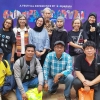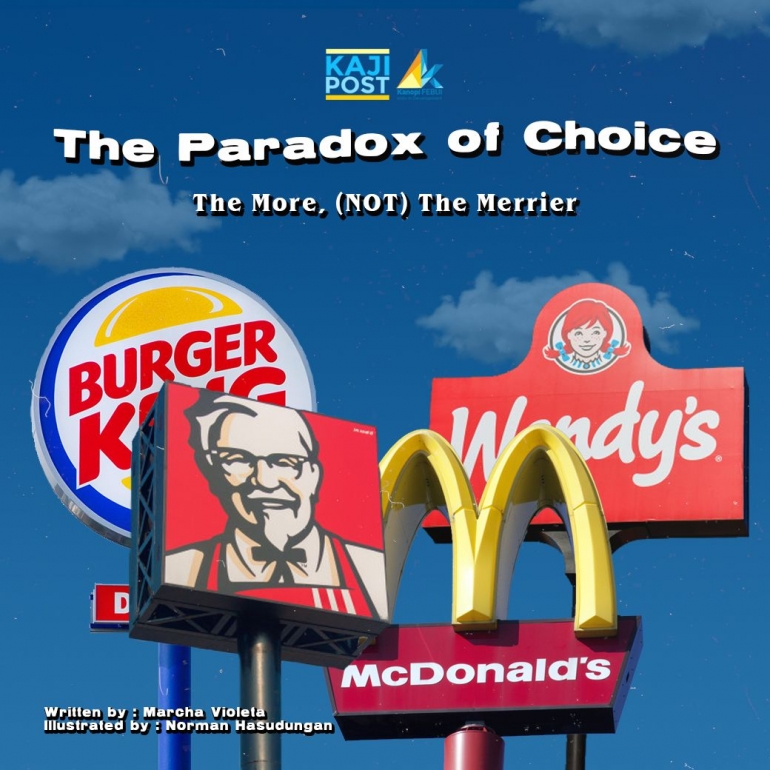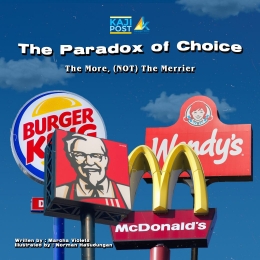Why do we frequently have a hard time choosing what to have for lunch? Why do some people who claim to commit in monogamous relationships actively seek other potential partners? Why do we insist on keeping some doors open even if we bear the bare minimum interest in them?
At first glance, those questions seem to carry little resemblance between each other---except for the fact that they lurk in the back of our minds as we have yet to find the appeasing answers.
However, as we look closer, we will notice that the core problem underlying this kind of questions may be one and the same, the paradox of choice. Here comes behavioural economics to help us answer those burning questions.
The conventional wisdom
Not a day goes by where we are not faced with a smorgasbord of decisions to make. A Cornell University study found that a human is estimated to make a daily average of over 200 decisions on food alone (Wansink and Sobal, 2007); we can only imagine how many other decisions are there to make each day.
With every decision, a myriad of options tags along, waiting to be chosen. The rapid improvements of technology in the last few decades since the 4th Industrial Revolution has given birth to the huge number of options that we can choose from. Technology does so in two ways.
First, it enables firms to diversify production and create new varieties of products. Second, technology also does so not by changing the depth of the pool of choices, but by easing the access to the said pool (e.g. online applications for dating and food delivery). In this day and age, things that were not readily available for us to choose are now only one-tap away on our smartphones.
Early economists used to think of choices the way a party animal would; the more, the merrier. In fact, the introduction of new choices means each unit of money that consumers own now is worth more (Mankiw, 2018).
Consider this example: in 2015, Gojek, an online ride-hailing application operating in Indonesia, launched a new feature called GoFood. The idea of GoFood is to let customers order food from restaurants and have them delivered by drivers who are dubbed as Gojek's partners.
Previously, there were already a small number of restaurants that provided delivery services through applications, but they were not integrated nor versatile. Gojek's GoFood increased customers' set of opportunities from which they can choose and compare their meal options. Through GoFood, Indonesian people could achieve the same level of economic well-being with fewer units of money, thus making them better-off.
Beware of the decision fatigue
As we have been exposed to the economic rationale of having more choices, we might begin to think that the premise is true for all times. However, it is not always the case. The nature of choice is paradoxical; a plethora of choices makes people happier because they can turn some of it down, yet people lack the self-control to refuse them (Thaler, 2018).
A Homo economicus would value an option solely on its expected outcome. Inversely, a normal person, who is prone to irrationality, would value a choice subjectively. That subjective value might be higher than the choice's expected value because of two reasons: the desire for flexibility and the aversion to loss (Shin and Ariely, 2004).
After conducting a series of experiments, Shin and Ariely collected evidence that shows how people overvalue the options that they have and are willing to overinvest to keep them from vanishing. Essentially, people exhibit the fear of missing out and are afraid of making suboptimal decisions if they 'hastily' settle on one option.
In an ideal---and unexisting---world, there would be no consequence to overinvest in keeping doors open. However, we always face trade-offs in making our decisions. Take, for example, the amount of time that a customer loses when they're browsing for lunch menus on GoFood because there are too options displayed in the application. That lost time could be used instead to work on other things or for leisure.
Another example used by Shin and Ariely is people involved in dating multiple romantic partners who have to exert extra effort, monetary or otherwise, to keep those partners available and not feel neglected. Because of wasted resources, those trade-offs eventually hinder productivity and sacrifice efficiency because of wasted resources.
Overcoming the temptation
How, then, can we resist the temptation to ponder over our choices for an unnecessarily long period of time? Or to stop wasting resources on unworthy options? Psychologist Barry Schwartz offers some insights to avoid these consequences.
Schwartz, in his book The Paradox of Choice -- Why Less is More, categorizes people into two when they're making decisions: maximizers and satisfiers. People can fall into different categories when they're making different decisions.
Maximizers seek for and are only willing to accept the best choice. Satisfiers, on the other hand, tend to settle on things that they judge as good enough and don't go looking for other options out there. Schwartz recommends his readers to satisfice more and maximize less.
He also reminds us to embrace the constraints that we face when making decisions, this way we must choose when to choose and allocate other resources accordingly. In conclusion, trivial and daily decisions should be made with the satisfier attitude while more important decisions may be maximized while still considering the constraints that one face.
By Rosalia Marcha Violeta | Economics 2018 | Staff of Studies Division Kanopi FEB UI 2019
References
Wansink, B., & Sobal, J. (2007). Mindless Eating: The 200 Daily Food Decisions We Overlook. Environment and Behavior, 39(1), 106--123. https://doi.org/10.1177/0013916506295573
Mankiw, N. (2018). Principles of Economics (8th ed., pp. 499-500). Cengage Learning.
Thaler, R. H. (2018) "From Cashews to Nudges: The Evolution of Behavioral Economics." American Economic Review, 108 (6): 1265-87. DOI: 10.1257/aer.108.6.1265
Shin, J., Ariely, D. (2004) Keeping Doors Open: The Effect of Unavailability on Incentives to Keep Options Viable. Management Science 50(5):575-586. http://dx.doi.org/10.1287/mnsc.1030.0148
Walker, K. (2014). The Paradox of Choice - Why More is Less by Barry Schwartz (Executive Book Summary). Retrieved from https://keithdwalker.ca/wp-content/summaries/m-p/Paradox%20of%20Choice.Schwartz.EBS.pdf
Baca konten-konten menarik Kompasiana langsung dari smartphone kamu. Follow channel WhatsApp Kompasiana sekarang di sini: https://whatsapp.com/channel/0029VaYjYaL4Spk7WflFYJ2H







